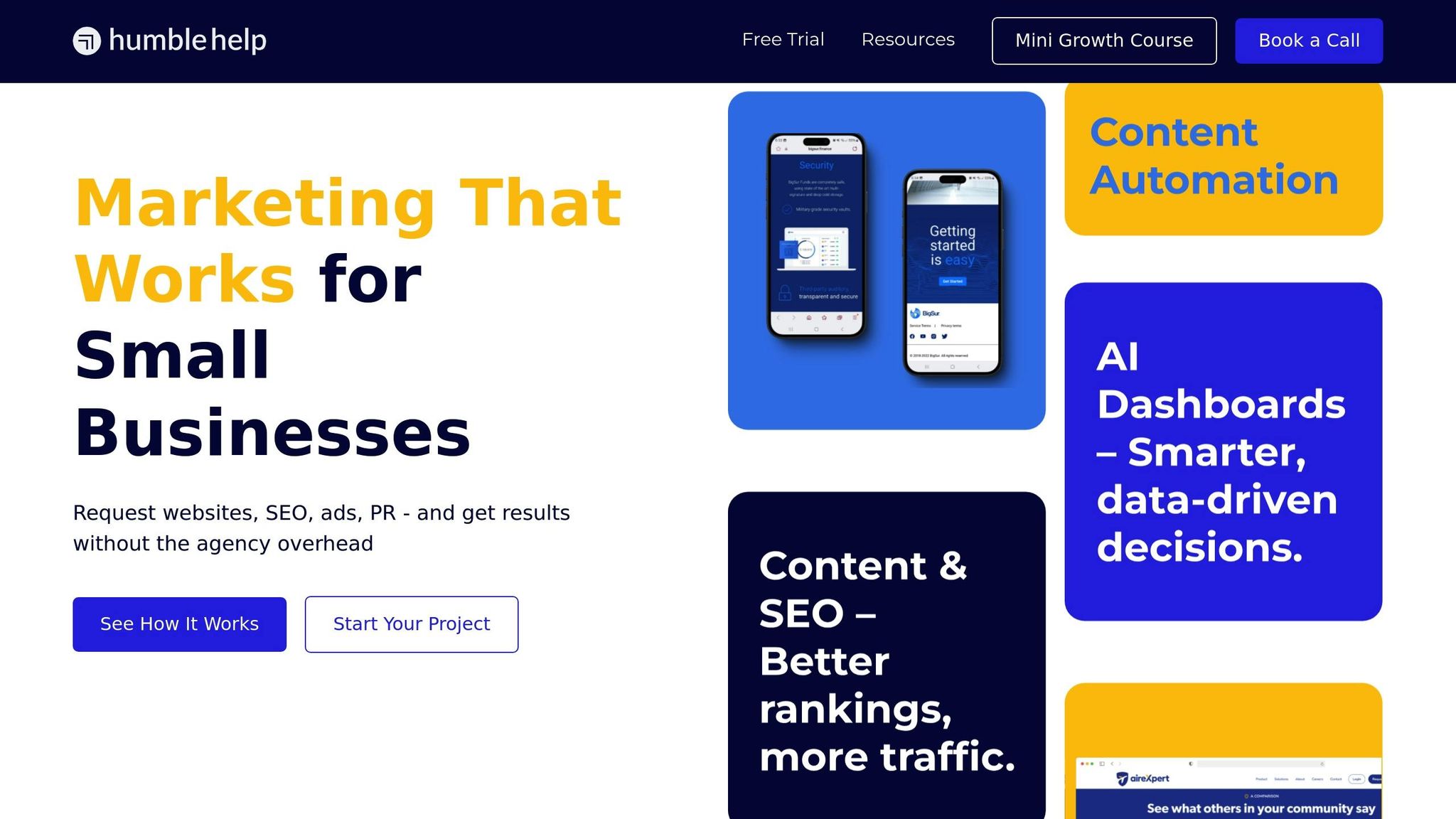
AI is changing how small businesses build trust with customers. It helps streamline operations, but businesses must balance automation with a personal touch. Here's what you need to know:
Small businesses are turning to AI to streamline operations and improve how they connect with customers, particularly in areas like marketing and customer service.
AI is transforming marketing by automating tasks like personalized email campaigns and scheduling social media posts, helping businesses engage customers more effectively. Tools like chatbots and virtual assistants are now commonly used to handle initial customer inquiries. Companies such as Humble Help stand out by blending AI-driven customer support with human oversight, ensuring quick responses while keeping interactions personal.
Some common uses for AI in marketing include:
While these tools offer a lot of potential, small businesses often face challenges when trying to adopt AI.
Adopting AI isn’t always easy. Costs, technical hurdles, integration difficulties, and data privacy concerns are some of the main obstacles. These issues can directly affect customer trust - problems like inconsistent experiences or concerns over data security can damage confidence. The lack of technical expertise makes it even harder for businesses to balance automation with genuine customer relationships.
Solutions like those offered by Humble Help tackle these challenges by combining AI’s efficiency with human expertise. For small businesses, overcoming these barriers is key to successfully using AI while maintaining customer trust.
Research shows that consumers have mixed feelings about the role of AI in business. Understanding these opinions is key to earning and keeping their trust.
Trust in AI-powered solutions often depends on how openly businesses communicate about their use of the technology. Many consumers appreciate clear explanations of when and how AI is used, along with assurances about data privacy. Some of the most important factors shaping trust include:
These factors also play a role in whether customers lean toward automated or human assistance.
When it comes to AI versus human service, preferences often depend on the task. Many customers are fine with automated systems for simple questions but prefer human help for more complex or sensitive issues. This highlights the need to balance AI's speed and convenience with the personalized touch only humans can provide.
Small businesses that combine the strengths of both - using AI for basic tasks while keeping human support readily available for more complicated needs - are more likely to boost customer satisfaction and loyalty.
Earning customer trust when using AI requires careful planning. Small businesses need to strike a balance between automation and clear communication, while keeping a personal touch to strengthen customer relationships.
Being open about how AI is used builds customer confidence. Small businesses should take steps like:
The goal is to keep customers informed without overwhelming them. A simple notification that mentions AI involvement - paired with an option to connect with a human - can set the right expectations. This transparency helps create a balanced approach that combines AI with human support.
A mix of AI and human assistance can deliver the best results. Small businesses can:
This approach allows businesses to benefit from AI’s efficiency while keeping the personal interaction that builds trust.

Humble Help demonstrates how to integrate AI responsibly with its Brand Boost Package. This service includes AI-driven website evaluations, automated SEO, and content automation tailored to maintain a business’s unique voice - all overseen by experts. It’s an example of how small businesses can use AI to improve their operations while keeping human connections at the forefront.
AI is reshaping how small businesses interact with customers, especially in areas like customer service and personalization. Predictive analytics now allow businesses to anticipate customer needs more effectively, addressing issues before they escalate. Voice AI and natural language processing are making automated interactions feel more personal, which is particularly helpful for businesses with smaller teams.
At the same time, as AI processes more customer data, businesses will need to navigate stricter data protection rules while maintaining a personal touch. Preparing for these changes is key to maintaining customer trust.
To stay ahead of these shifts, small businesses should focus on using AI responsibly. Here are some steps to take:
1. Set Clear AI Boundaries
Define when and how AI will be used in customer interactions. This means:
2. Conduct Regular AI Audits
Keep track of how AI is performing and its impact on customer trust. This involves:
3. Be Transparent to Build Trust
Help customers feel confident about AI by being open about its role. For example:
When it comes to earning and keeping consumer trust in AI-driven systems, small businesses need to focus on clarity, balance, and security. Here's how to make it work:
Be Clear About AI Use
Find the Right Balance
Prioritize Data Security
Respect Privacy While Personalizing
Keep Improving
Discover strategies to elevate your business.